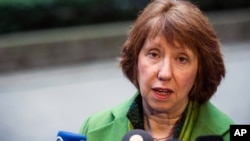The European Union has split over whether to arm Syrian rebels, with international special envoy Lakhdar Brahimi calling again for a political solution to end two years of bloodshed that has killed an estimated 70,000 people.
Brahimi called a military solution "out of the question" Monday after meeting the EU's 27 foreign ministers in Brussels. France's top diplomat, Laurent Fabius, disagreed.
"It seems obvious to me that the question of lifting the arms embargo is more and more on the table because we have an obvious lack of balance between the Assad regime, which has weapons coming from Iran, Russia — powerful weapons — and the [rebel] National Coalition, which doesn't have the same weapons," Fabius said.
The ministers were sharply divided, with Britain and Italy joining France in supporting eventual military aid for the opposition while Germany, Sweden and others see that as moving in the wrong direction.
Sweden's Carl Bildt warned that a military solution carries the risk of "the devastation of the region."
On her way into the meeting, EU foreign policy chief Catherine Ashton said she supports a political solution.
"We need to stop this killing, we need to stop the violence that's happening in Syria and to find a way in which the opposition can really move forward on a political solution," she said.
Ashton reiterated calls for Syrian President Bashar al-Assad to step down, saying that the "devastating impact of his policies is obvious for all to see."
The Syrian National Coalition said it was postponing a meeting to form a provisional government; coalition spokesman Walid al-Bunni told VOA that members are split over whether to choose a new government now or wait and see if U.N. negotiations can offer a political solution.
He said the election to choose a prime minister will now be held no later than March 20. The meeting was due to be held on March 12 after being postponed once already.
Also Monday, investigators released the latest report on Syria to the U.N. Human Rights Council, saying the situation is "deteriorating rapidly," and that both government troops and rebels have committed war crimes.
The report said abuses by rebels were not on the same scale as those by government troops, but that both sides were found to have used child fighters.
The chairman of the four-member investigative panel, Paulo Sergio Pinheiro, said the U.N.-appointed body is collecting evidence on 20 massacres in Syria.
Syria's state-run news agency reported Monday that at least three civilians were killed and 28 others injured when mortar shells slammed into a building in southern Damascus. The report blamed the shelling on "terrorists," a term the government frequently uses to describe rebel fighters.
Brahimi called a military solution "out of the question" Monday after meeting the EU's 27 foreign ministers in Brussels. France's top diplomat, Laurent Fabius, disagreed.
"It seems obvious to me that the question of lifting the arms embargo is more and more on the table because we have an obvious lack of balance between the Assad regime, which has weapons coming from Iran, Russia — powerful weapons — and the [rebel] National Coalition, which doesn't have the same weapons," Fabius said.
The ministers were sharply divided, with Britain and Italy joining France in supporting eventual military aid for the opposition while Germany, Sweden and others see that as moving in the wrong direction.
Sweden's Carl Bildt warned that a military solution carries the risk of "the devastation of the region."
On her way into the meeting, EU foreign policy chief Catherine Ashton said she supports a political solution.
"We need to stop this killing, we need to stop the violence that's happening in Syria and to find a way in which the opposition can really move forward on a political solution," she said.
Ashton reiterated calls for Syrian President Bashar al-Assad to step down, saying that the "devastating impact of his policies is obvious for all to see."
The Syrian National Coalition said it was postponing a meeting to form a provisional government; coalition spokesman Walid al-Bunni told VOA that members are split over whether to choose a new government now or wait and see if U.N. negotiations can offer a political solution.
He said the election to choose a prime minister will now be held no later than March 20. The meeting was due to be held on March 12 after being postponed once already.
Also Monday, investigators released the latest report on Syria to the U.N. Human Rights Council, saying the situation is "deteriorating rapidly," and that both government troops and rebels have committed war crimes.
The report said abuses by rebels were not on the same scale as those by government troops, but that both sides were found to have used child fighters.
The chairman of the four-member investigative panel, Paulo Sergio Pinheiro, said the U.N.-appointed body is collecting evidence on 20 massacres in Syria.
Syria's state-run news agency reported Monday that at least three civilians were killed and 28 others injured when mortar shells slammed into a building in southern Damascus. The report blamed the shelling on "terrorists," a term the government frequently uses to describe rebel fighters.





